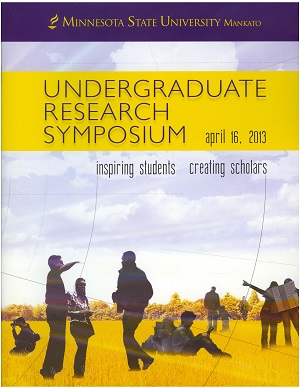Body Image and Perception
Location
CSU Ballroom
Start Date
16-4-2013 2:00 PM
End Date
16-4-2013 4:00 PM
Student's Major
Psychology
Student's College
Social and Behavioral Sciences
Mentor's Name
Kathy Bertsch
Mentor's Department
Psychology
Mentor's College
Social and Behavioral Sciences
Description
Negative self-image and low self-esteem are connected to body dissatisfaction and are significant predictors of the self-esteem and self-image in adolescence (Anderson & Kemp, 2012). This research examines the relationship between social situations and body-esteem. Subjects are surveyed to determine their body esteem and degree of body comparison in social situations. Subjects are randomly assigned to 1 of 2 conditions: positive social feedback or control. The degree to which positive social feedback influences body self-esteem is measured through body self-esteem ratings after the treatment/control conditions. This research will answer whether participants who receive the positive feedback treatment will have better body esteem than the control condition. It is also relevant with this study to answer how college students typically perceive themselves and how they perceive themselves compared to others. We will also answer questions specific to social aspects of body esteem such as discovering what social situations influence negative self-comparison or negative self-perception, if body esteem is significantly higher for high comparison groups compared to the control group and if high self comparison groups are more at risk for eating disorders, anxiety and depression. The current study aims to better understand how body self-image is dependent on the context in which it is viewed. With better understanding of body distortion, further prevention and treatment can be applied to individuals with eating disorders.
Body Image and Perception
CSU Ballroom
Negative self-image and low self-esteem are connected to body dissatisfaction and are significant predictors of the self-esteem and self-image in adolescence (Anderson & Kemp, 2012). This research examines the relationship between social situations and body-esteem. Subjects are surveyed to determine their body esteem and degree of body comparison in social situations. Subjects are randomly assigned to 1 of 2 conditions: positive social feedback or control. The degree to which positive social feedback influences body self-esteem is measured through body self-esteem ratings after the treatment/control conditions. This research will answer whether participants who receive the positive feedback treatment will have better body esteem than the control condition. It is also relevant with this study to answer how college students typically perceive themselves and how they perceive themselves compared to others. We will also answer questions specific to social aspects of body esteem such as discovering what social situations influence negative self-comparison or negative self-perception, if body esteem is significantly higher for high comparison groups compared to the control group and if high self comparison groups are more at risk for eating disorders, anxiety and depression. The current study aims to better understand how body self-image is dependent on the context in which it is viewed. With better understanding of body distortion, further prevention and treatment can be applied to individuals with eating disorders.
Recommended Citation
Dittel, Heather. "Body Image and Perception." Undergraduate Research Symposium, Mankato, MN, April 16, 2013.
https://cornerstone.lib.mnsu.edu/urs/2013/poster-session-B/51




